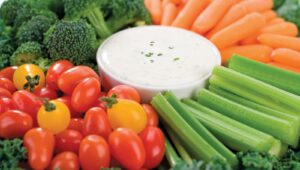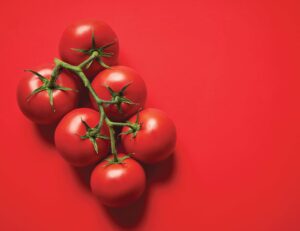Current statistics show that over 38% of Americans will develop cancer during their lifetime. And some research indicates that cancer may reach a 50% rate sometime over the next few decades. The vast majority of people will be touched by cancer in some way, either personally or through close family and friends. Cancer became especially personal for me when my husband was diagnosed with a precancerous condition earlier this year. I had taken an elective course in nutrition for cancer as part of a nutrition degree, but I reviewed this topic again recently when I read the book Radical Remission.
The author of this book, Kelly Turner, Ph.D., became interested in this topic as a young person after several close relatives and friends died of cancer. Turner studied psychology and sociology and became a counselor to cancer patients. Her doctoral dissertation was a study of cancer patients whose cancer went away, either without conventional medical treatment or which went into remission unexpectedly after some combination of conventional and alternative treatments. She initially studied over 1,000 cases of these radical remissions. Turner’s work has expanded to include studies of over 1,500 cases, a website that offers training for cancer patients and the book Radical Remission.
After analyzing these cases, Dr. Turner found over 75 factors that might have played a role in cancer remission. Nine of these factors occurred most frequently and virtually all of the nine were common to the survivors. Two of these were physical: radically changing the diet and using supplements. The remaining seven were emotional and spiritual. Since the book was published, Dr. Turner has found that exercise is a tenth essential healing factor. A book that is an excellent resource for the emotional and spiritual factors of cancer treatment is Cancer, Now What? by Kenneth Hauck, Ph.D.
Dietary Factors Involved in Healing From Cancer
Radical Remission identifies four dietary changes common to those who healed from cancer. Similar diets are commended in the book, Beating Cancer with Nutrition by Patrick Quillin, as well as other nutrition resources that I have used over the years. These nutrition factors can be subdivided into foods to greatly reduce or eliminate from the diet and foods to add or greatly increase.
Foods that were reduced or eliminated included sugar, meat, dairy and processed foods. Foods that were increased include healthy vegetables and fruits, organic foods and filtered water.
Sugar
Sugar feeds cancer. Cancer cells consume 10 to 50 times more glucose than normal cells. In fact, the PET scan that is used to detect cancer uses glucose (sugar) to find the places in your body where cancer is located. Cancer is much more likely to occur in individuals who are obese, have metabolic syndrome, or diabetes. These conditions are influenced by eating diets heavy in sugar and processed foods. Eliminating added sugar may be one key to help starve cancer cells.
Meat
A majority of those in Kelly’s study eliminated meat from their diet. A high intake of processed meat has been shown to be associated with many cancers, especially of the colon, stomach and esophagus. Red meat (beef, pork, lamb) also seems to have some association with these same cancers, although not to the statistical significance of processed meat. There has been mixed research on the consumption of chicken and eggs and cancer. Fish, especially cold-water fish such as salmon, can be protective against cancer due to its high omega-3 content. Eliminating processed and red meat may be advisable for those who have cancer. Several cancer research organizations recommend eliminating processed meat and limiting red meat to three four-ounce servings per week for cancer prevention.
Dairy
Radical remission survivors eliminated dairy products for the most part. A protein (casein) in milk has been shown to facilitate cancer cell growth in animals. There also can be a high amount of hormones and inflammatory omega-6 fats in conventional dairy. Whole milk consumption was associated with an increase in prostate cancer in some studies. Other studies have shown that a high consumption of dairy is associated with a reduced risk of overall mortality and some cancers such as colorectal, breast and bladder cancer. The research that I have seen does not give a definitive conclusion about dairy and cancer treatment.
Refined and Processed Foods
Processed foods are much more likely to be filled with chemicals or added ingredients. In addition, processed foods are often high in added sugars, excessive carbohydrates and excessive inflammatory bad fats. Eliminating refined foods, especially white breads and pastas, helps reduce the glycemic load of the diet and reduce blood sugar. Substantially reducing processed food consumption is advisable for both cancer treatment and prevention.
Add Vegetables and Fruits
Radical remission survivors greatly increased their intake of colorful vegetables and fruits. Cruciferous vegetables (broccoli, cabbage, kale), allium vegetables, (onions, garlic), and dark berries have all been shown to contain many cancer-fighting properties. Studies with breast cancer patients have shown a 50% reduction in mortality when they consistently ate five or more servings of vegetables daily and exercised 30 minutes on most days.
Eat Organic
Many cancers are related to exposure to toxins. Nicotine, asbestos and formaldehyde have been shown definitely to cause cancer. A number of pesticides may also be related to certain cancers. Glyphosate, the most commonly used herbicide, has been classified as a probable carcinogen by several international organizations. To reduce exposure to all toxins and help the body heal, it could be wise to eat organic foods.
Drink Filtered Water
Most radical remission survivors eliminated soda, juice, and milk and drank eight glasses of clean water daily. About two-thirds of the human body is water. Drinking lots of clean water can help the body flush out toxins, viruses and bacteria. The chlorine and fluoride in tap water has not been definitively tied to cancer, but to be on the safe side, many cancer patients choose spring water or filtered water.

By Ginger Hudock’s
Ginger Hudock’s eclectic background includes degrees in vocal performance, finance and nutrition. She worked as the Vice Chancellor for Business and Finance at USC Aiken for 25 years before beginning her nutrition career. Her writing has appeared on-line at TheMighty.com, in addition to a monthly nutrition column for Aiken’s Bella Magazine. You can read more of Ginger’s articles about food, nutrition, faith and personal finance at her blog www.GingerHudock.com.























